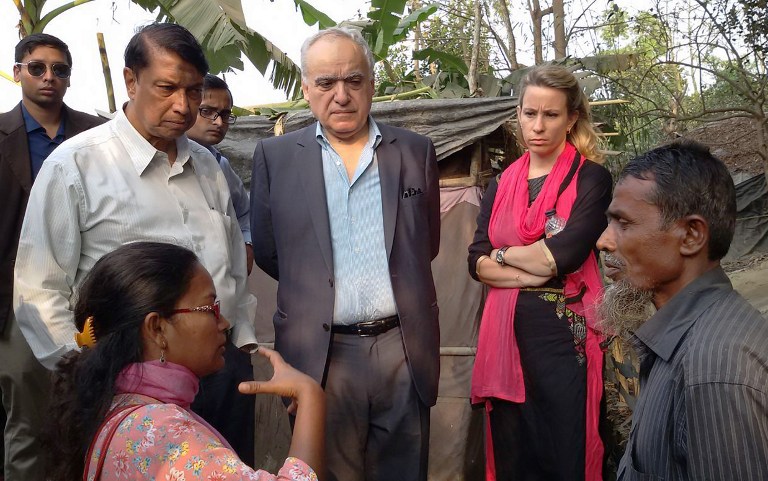
Bangladesh authorities have revived a plan to relocate tens of thousands refugees from Myanmar to a desolated island, years after they seemed to have ditched the controversial initiative. / AFP PHOTO / STR
DHAKA, Bangladesh (AFP) – Bangladesh will push ahead with a controversial plan to relocate tens of thousands of Rohingya refugees from Myanmar to a remote island despite warnings it is uninhabitable and prone to flooding.
The government has set up a committee comprising state officials in the coastal districts, ordering authorities to help identify and relocate undocumented Myanmar nationals to Thengar Char in the Bay of Bengal.
“The committee will assist transferring both registered and unregistered refugees from Myanmar to Thengar Char near Hatiya island in Noakhali district,” according to an order issued by the Cabinet Division last week and posted online.
Hatiya is situated on the estuary of the River Meghna and is a nine-hour journey away from the camps where the Rohingya have taken shelter.
Some 232,000 Rohingya Muslims — both registered and unregistered — were already living in Bangladesh before more than 65,000 stateless Rohingya fleeing violence in Myanmar’s western state of Rakhine began entering the country last October.
Most of those who fled to Bangladesh live in squalid conditions in refugee camps in Cox’s Bazar district, which borders Rakhine state and is home to the country’s biggest tourist resort.
Bangladesh has also asked its officials in the border districts to identify the Myanmar nationals who “illegally infiltrated” the country.
“It has to be assured by taking preventive measures that they (refugees) cannot spread out and mix with the locals,” read the order which was dated January 26.
“The identified refugees should be arrested or pushed back to the camps if they try to go out beyond the assigned boundary.”
Bangladesh first mooted the idea of relocating them in 2015 despite allegations that the island was still not ready for human habitation.
The idea sparked outcry from Rohingya community leaders, while a UN agency said a forced relocation would be “very complex and controversial”.
‘Terrible idea’
An official in the region criticised the idea, saying the 6,000-acre (2,430-hectare) island was “only accessible during winter and a haven for pirates”.
The authorities were planting trees in a bid to shore up land against high tides and flooding, but those efforts were at least a decade away from completion, the official added.
“It completely inundates during the monsoon,” the official told AFP, speaking on condition of anonymity.
“It’s a terrible idea to send someone to live there.”
There was no immediate comment from the Rohingya community leaders.
The island push came as members of Myanmar’s state-appointed body probing violence in Rakhine state visited refugee camps in Cox’s Bazaar.
Three members of the commission, which is headed by former UN chief Kofi Annan, spoke to refugees who recalled horrific incidents of rape and murder at the hands of Myanmar’s security forces.
Kamal Hossain, 50, told the observer team his entire village was burned to the ground and his brother killed by the army, forcing him to flee to Bangladesh for safety.
“We want to go back home. We don’t want to live as refugees here, but we need assurance that we will not be slaughtered like cattle,” he told AFP.
Dudu Mia, a Rohingya community leader, said he hoped the commissioners would relay to the government in Myanmar about “our people being killed and tortured and women raped by their security forces”.
The team also met with Bangladeshi officials at Cox’s Bazar, and was due to hold talks with the country’s Prime Minister Sheikh Hasina before their departure on February 1.
“The commission came to see for themselves whether these people were forced to come here,” Ali Hossain, chief administrator of the district, told AFP.








